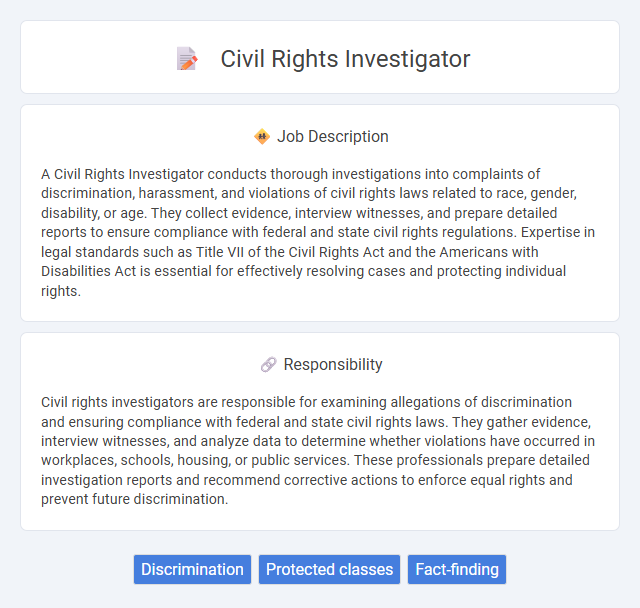
A Civil Rights Investigator conducts thorough investigations into complaints of discrimination, harassment, and violations of civil rights laws related to race, gender, disability, or age. They collect evidence, interview witnesses, and prepare detailed reports to ensure compliance with federal and state civil rights regulations. Expertise in legal standards such as Title VII of the Civil Rights Act and the Americans with Disabilities Act is essential for effectively resolving cases and protecting individual rights.
People who are passionate about social justice and possess strong analytical and communication skills are likely suitable for a civil rights investigator position. Those comfortable with conducting detailed research, interviewing witnesses, and navigating legal frameworks may find this role fulfilling. Individuals who thrive in advocacy environments and are patient with complex bureaucratic processes have a higher probability of success in this career.
Qualification
A Civil Rights Investigator requires a bachelor's degree in social sciences, law, or a related field, with preference given to candidates holding advanced degrees or specialized certifications in civil rights or human rights. Proven experience in conducting investigations, analyzing legal documents, and understanding federal and state civil rights laws is essential for effective case management. Strong communication skills, attention to detail, and the ability to handle sensitive information ethically are critical qualifications for success in this role.
Responsibility
Civil rights investigators are responsible for examining allegations of discrimination and ensuring compliance with federal and state civil rights laws. They gather evidence, interview witnesses, and analyze data to determine whether violations have occurred in workplaces, schools, housing, or public services. These professionals prepare detailed investigation reports and recommend corrective actions to enforce equal rights and prevent future discrimination.
Benefit
A Civil Rights Investigator likely offers significant benefits such as a sense of purpose through protecting individuals' rights and promoting equality. The role may provide opportunities for professional growth in legal and social justice fields. Competitive salaries and comprehensive benefits packages are probable, reflecting the importance of this specialized position.
Challenge
Civil rights investigators likely face complex challenges involving thorough evidence collection and impartial analysis under high public scrutiny. The probability of encountering sensitive and emotionally charged cases may require exceptional negotiation and conflict resolution skills. Navigating legal frameworks while ensuring fairness could remain a persistent obstacle in achieving just outcomes.
Career Advancement
A Civil Rights Investigator plays a crucial role in enforcing anti-discrimination laws by examining complaints related to civil rights violations and ensuring compliance with federal and state regulations. Career advancement opportunities in this field often lead to senior investigator positions, supervisory roles, or specialist titles such as Equal Employment Opportunity (EEO) Officer or Compliance Manager. Developing expertise in investigative techniques, legal knowledge, and interagency collaboration enhances prospects for upward mobility within government agencies or private sector organizations focused on civil rights enforcement.
Key Terms
Discrimination
A Civil Rights Investigator specializes in examining complaints related to discrimination based on race, gender, disability, age, or other protected characteristics under laws such as the Civil Rights Act and the Americans with Disabilities Act. They gather evidence, interview witnesses, and analyze data to determine if violations have occurred and recommend corrective actions or legal enforcement. This role requires a thorough understanding of federal and state anti-discrimination statutes to ensure fair treatment and equal opportunities for all individuals.
Protected classes
A Civil Rights Investigator enforces laws protecting individuals from discrimination based on protected classes such as race, color, national origin, sex, disability, and religion. This role involves gathering evidence, interviewing witnesses, and ensuring compliance with federal and state civil rights statutes. Expertise in recognizing violations related to protected classes is essential for safeguarding equal opportunity and justice in housing, employment, and education.
Fact-finding
A Civil Rights Investigator conducts thorough fact-finding to uncover evidence related to discrimination claims and violations of civil rights laws. This role involves interviewing witnesses, collecting documents, and analyzing data to establish whether legal protections have been breached. Effective fact-finding ensures impartial and detailed investigations that support enforcement actions and policy recommendations.
 kuljobs.com
kuljobs.com